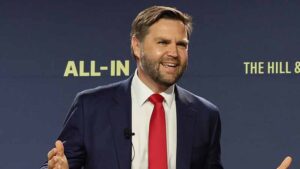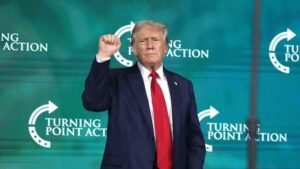
Kevin Lamarque | Jay Paul | Reuters
Former President Donald Trump’s recent campaign rally in South Florida has stirred controversy and amusement alike, particularly due to his increasingly bizarre claims, as reported by Richard Luscombe for The Guardian.
Trump’s speech at his Doral golf club featured his classic rhetoric, including unsubstantiated assertions such as the U.S. losing energy independence and plans for electric tanks in the military. However, a new claim stood out amidst the usual fare: Trump insisted that President Joe Biden had caused the price of bacon to increase four-fold. Luscombe described the rally as “touching on the surreal,” with Trump proclaiming, “We don’t eat bacon anymore.”
Contrary to Trump’s statement, data reveals a different reality. Bacon prices averaged $5.58 per pound during the last year of Trump’s presidency, spiked to $7.31 per pound in 2022, and currently stand at approximately $6.82 per pound as of recent statistics. Moreover, wage increases have outpaced inflation over the past year, meaning that in terms of purchasing power, bacon prices have remained relatively stable compared to most of Trump’s tenure.
The rally also saw Trump issuing challenges, notably calling for another debate with Biden under specific conditions: “no moderators” and “no holds barred.” Trump even proposed an 18-hole golf match where he pledged to donate $1 million to a charity of Biden’s choice if Biden managed to defeat him.
In response, Biden’s campaign reacted dismissively to Trump’s challenges, highlighting Trump’s absence from public appearances in recent days. They characterized Trump’s remarks as ranging from inviting fictional characters to dinner, poking fun at Senator Marco Rubio, praising Tom Homan, and challenging the sitting President of the United States to a golf match.
Trump’s rally exemplifies his ongoing presence in American politics, marked by provocative statements and challenges that continue to capture media attention. Despite the factual inaccuracies in his claims about bacon prices, Trump’s ability to command public discourse remains undiminished, reflecting his enduring influence within the Republican Party and the broader political landscape.


